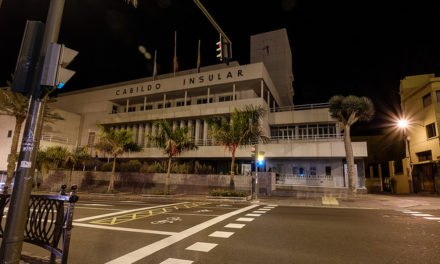 The president of the Cabildo de Gran Canaria, Antonio Morales, has sent a letter to the president of the European Investment Bank, Werner Hoyer, and to the president of the European Parliament, Antonio Tajani, and the president of the European Commission, Jean-Claude Junker, in which he openly questions the €125 million loan granted to the multinational company Redexis to introduce, consume and burn gaseous hydrocarbons in the Canary Islands and urges that this funding be withdrawn and used instead to promote clean energy.
The president of the Cabildo de Gran Canaria, Antonio Morales, has sent a letter to the president of the European Investment Bank, Werner Hoyer, and to the president of the European Parliament, Antonio Tajani, and the president of the European Commission, Jean-Claude Junker, in which he openly questions the €125 million loan granted to the multinational company Redexis to introduce, consume and burn gaseous hydrocarbons in the Canary Islands and urges that this funding be withdrawn and used instead to promote clean energy.
In the letter, the governing Cabildo of Gran Canaria considers that the European Investment Bank finances -using European public funds- in this case contravenes one of the three basic principles of the entity itself, namely the fight against climate change, which is why it it has moved the sub-tropical island’s Presidency to send this request to reconsider the funding decision, and to instead direct that money to the development of clean and sustainable energies in the Canary Islands.
The archipelago has an extraordinary potential to implement renewable energy and contribute to achieving the essential energy sovereignty of the Islands at a time when, additionally, “decarbonisation” processes are priority challenges in European and international economies in their efforts to reduce emissions of greenhouse gases (GHG).
The European Investment Bank has in the past had to reassess other capital, injected to entities or projects, because of proven fraud or policies that would produce clear social harm, such as in the case of the Volkswagen or the Castor Platform emissions, and it is the opinion of the Cabildo de Gran Canaria that recent support to Redexis -owned by the American investment fund Goldman Sachs-, to introduce gas networks on the Islands represents “a new and evident case of social, environmental and energy unsustainability”.
 Redexis establishes in its corporate ethics code “the adoption of commercial actions within a framework of ethical, social, environmental and economically responsible behaviour”, but its decision in the Canary Islands openly violates these precepts by imposing its private interests over social and environmental ones ignoring multiple sectors in the Canary Islands that reject the continuance of the burning of hydrocarbons as a viable source of energy for the future.
Redexis establishes in its corporate ethics code “the adoption of commercial actions within a framework of ethical, social, environmental and economically responsible behaviour”, but its decision in the Canary Islands openly violates these precepts by imposing its private interests over social and environmental ones ignoring multiple sectors in the Canary Islands that reject the continuance of the burning of hydrocarbons as a viable source of energy for the future.
In the letter addressed, to the presidents of the European Investment Bank, the European Parliament and the European Commission, the Cabildo de Gran Canaria exposes emphasises various arguments requesting the reconsideration of this operation because it is counterproductive in terms of greenhouse gas emissions, sustainability, safety, profitability and transparency, among other reasons.
The Cabildo de Gran Canaria actively cooperate with the authorities, as well as social, environmental and political organisations of the Canary Islands, the state and internationally, with the aim of progressing a committed movement towards a social, independent and sustainable energy model, that is specifically opposed to polluting fossil fuels.
The agreement signed between the Bank and Redexis “alludes to the fact that the investment aimed at expanding gas in the Canary Islands is part of the so-called Junker Plan to boost job creation, growth and competitiveness in the energy, environmental and anti-climate-change sectors, but it is clear that the announced investment also directly clashes with the fundamental principles of this European Plan, says the letter signed by the president “who recalls, on the other hand, that the penetration of renewables is a huge niche for the creation of employment and research and that the Canary Islands is in a position to become an international benchmark in this area.
In addition, “various countries of the European Union and major cities of the continent are addressing the progressive closure of plants and gas distribution networks as part of their firm commitments to reduce pollutant emissions, so it is very difficult to explain and to understand that the Canary Islands would now promote antagonistic policies about such well-proven and necessary efforts “.
The energy policy of the European Union for the islands of the Ultraperipheral Regions, the president said in his letter, prioritizes the use of clean energy to reduce their dependence on fossil fuels, “clearly resulting in a contradiction that from the Union European and from the European Investment Bank in their apparent support of new infrastructure of such great magnitude to store, process, distribute, consume and burn more fossil fuels”, a project that also has seen no feasibility studies or clients and is on track to finally generate a deficit for which it is the citizens who will in the end pay.
The letter explains that The Canary Islands possess extraordinary conditions to generate energy from clean sources, from the air, thermal heat, wind, sea and from the sun, and explains that the supposed economic and environmental benefits of gas are non-existent, as they are only relevant to its combustion and do not take into account the entire process of obtaining this fuel.
The president of the Cabildo, Antonio Morales, explained that “the letter addressed to the European institutions responds to an inescapable and firm commitment by the Corporation in its focus on cutting-edge energy and social policies, with a vision of the future adapted to the recommendations of the scientific community, the European Union and the United Nations. “













